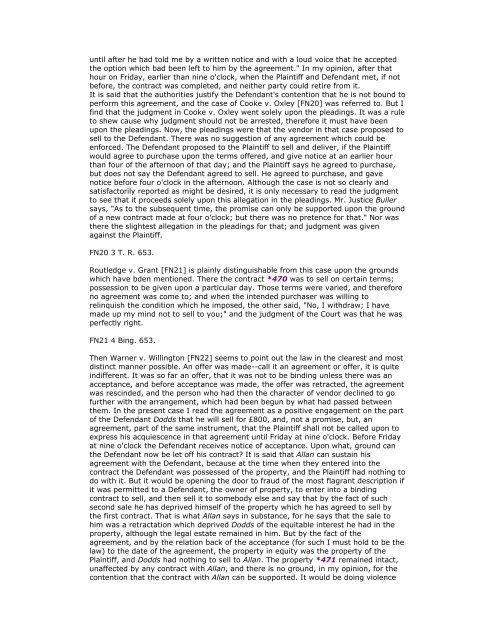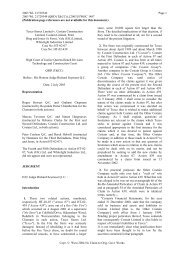Dickinson v Dodds - Thomson Reuters
Dickinson v Dodds - Thomson Reuters
Dickinson v Dodds - Thomson Reuters
Create successful ePaper yourself
Turn your PDF publications into a flip-book with our unique Google optimized e-Paper software.
until after he had told me by a written notice and with a loud voice that he acceptedthe option which bad been left to him by the agreement." In my opinion, after thathour on Friday, earlier than nine o'clock, when the Plaintiff and Defendant met, if notbefore, the contract was completed, and neither party could retire from it.It is said that the authorities justify the Defendant's contention that he is not bound toperform this agreement, and the case of Cooke v. Oxley [FN20] was referred to. But Ifind that the judgment in Cooke v. Oxley went solely upon the pleadings. It was a ruleto shew cause why judgment should not be arrested, therefore it must have beenupon the pleadings. Now, the pleadings were that the vendor in that case proposed tosell to the Defendant. There was no suggestion of any agreement which could beenforced. The Defendant proposed to the Plaintiff to sell and deliver, if the Plaintiffwould agree to purchase upon the terms offered, and give notice at an earlier hourthan four of the afternoon of that day; and the Plaintiff says he agreed to purchase,but does not say the Defendant agreed to sell. He agreed to purchase, and gavenotice before four o'clock in the afternoon. Although the case is not so clearly andsatisfactorily reported as might be desired, it is only necessary to read the judgmentto see that it proceeds solely upon this allegation in the pleadings. Mr. Justice Bullersays, "As to the subsequent time, the promise can only be supported upon the groundof a new contract made at four o'clock; but there was no pretence for that." Nor wasthere the slightest allegation in the pleadings for that; and judgment was givenagainst the Plaintiff.FN20 3 T. R. 653.Routledge v. Grant [FN21] is plainly distinguishable from this case upon the groundswhich have bden mentioned. There the contract *470 was to sell on certain terms;possession to be given upon a particular day. Those terms were varied, and thereforeno agreement was come to; and when the intended purchaser was willing torelinquish the condition which he imposed, the other said, "No, I withdraw; I havemade up my mind not to sell to you;" and the judgment of the Court was that he wasperfectly right.FN21 4 Bing. 653.Then Warner v. Willington [FN22] seems to point out the law in the clearest and mostdistinct manner possible. An offer was made--call it an agreement or offer, it is quiteindifferent. It was so far an offer, that it was not to be binding unless there was anacceptance, and before acceptance was made, the offer was retracted, the agreementwas rescinded, and the person who had then the character of vendor declined to gofurther with the arrangement, which had been begun by what had passed betweenthem. In the present case I read the agreement as a positive engagement on the partof the Defendant <strong>Dodds</strong> that he will sell for £800, and, not a promise, but, anagreement, part of the same instrument, that the Plaintiff shall not be called upon toexpress his acquiescence in that agreement until Friday at nine o'clock. Before Fridayat nine o'clock the Defendant receives notice of acceptance. Upon what, ground canthe Defendant now be let off his contract? It is said that Allan can sustain hisagreement with the Defendant, because at the time when they entered into thecontract the Defendant was possessed of the property, and the Plaintiff had nothing todo with it. But it would be opening the door to fraud of the most flagrant description ifit was permitted to a Defendant, the owner of property, to enter into a bindingcontract to sell, and then sell it to somebody else and say that by the fact of suchsecond sale he has deprived himself of the property which he has agreed to sell bythe first contract. That is what Allan says in substance, for he says that the sale tohim was a retractation which deprived <strong>Dodds</strong> of the equitable interest he had in theproperty, although the legal estate remained in him. But by the fact of theagreement, and by the relation back of the acceptance (for such I must hold to be thelaw) to the date of the agreement, the property in equity was the property of thePlaintiff, and <strong>Dodds</strong> had nothing to sell to Allan. The property *471 remained intact,unaffected by any contract with Allan, and there is no ground, in my opinion, for thecontention that the contract with Allan can be supported. It would be doing violence
















